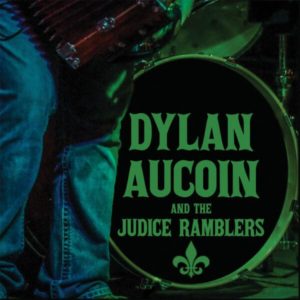It must be an exciting time for Cajun music with all the emerging young guns carrying the cultural banner forward. Count 23-year-old Dylan Aucoin among that class. The talented accordionist has been fronting The Judice Ramblers since high school, not long after meeting soulmate and fiddler Luke Huval at a jam. When Aucoin landed his first gig, he dialed Huval immediately, and bam, the nucleus of the band was formed.
The group performs mainly as a quartet but occasionally snags a steel guitarist for the gala gigs. For Aucoin’s auspicious debut recording, he loaded up on steelers with Richard Comeaux and Laine Thibodeaux, who play five and six tracks each. With this hefty steel presence, it’s evident that Aucoin and the Judice Ramblers bask in the dancehall style of Cajun music, but the influences go deeper than that. Aucoin, a country-leaning vocalist, never desired to sing until inspired by High Performance’s Jamey Bearb. Like High Performance, The Judice Ramblers also adores its idol, Belton Richard, by performing three Belton originals and renditions of Lefty Frizzell’s “She’s Gone Gone Gone” and Hank Williams’ “Wedding Bells” that Richard once translated into French.
Aucoin kicks off the proceedings with a bustin’ version of “Flammes D’Enfer,” a vivid testament to his masterful chops. He practically breaks the speed limit while maintaining uncanny precision and accuracy. Thibodeaux adds a sense of swing to “Flammes” with his offsetting fill-ins before soaring on his solos.
Similarly, the rambunctious closer “Went to the Dance” will require short, quick steps if dancers want to keep pace. Indeed, it’s a band that performs at a high level. Huval exhibits a lovely tone in his fiddling that sometimes can be eye-watering (“Give Me Another Chance”). When it comes to vocals, many bands would kill to have quality vocalists like Aucoin and Huval, who convey the utmost sincerity.
What else is interesting is the Judice Ramblers’ integration of English-sung country songs into its Cajun dancehall format. Willie Nelson’s “Sad Songs and Waltzes” lament and Conway Twitty’s pulsating “I’ll Try” are a natural fit, culling from the best of both worlds.
Yet, it’s more than just chops, hops and props. Aucoin and Huval are also budding songwriters, with one original each. Aucoin’s swamp popper “Living in Misery” is sung ever so soulfully, enhanced by Huval’s fluid electric guitar lines and guest Pat Breaux’s sax work. Huval wrote the poignantly beautiful “The Prison of Her Memory” in French. Initially, he describes a young couple in love from a third-person perspective. Seasons change to the winter, and the girl soon finds another. In the last couple of lines, Huval reveals that guy was him, eternally trapped in the prison of her memory. It’s a poetic, emotional moment, augmented by the Ramblers and steeler Comeaux’s majestic treatment. This is more than just an auspicious debut—it’s a knockout.




